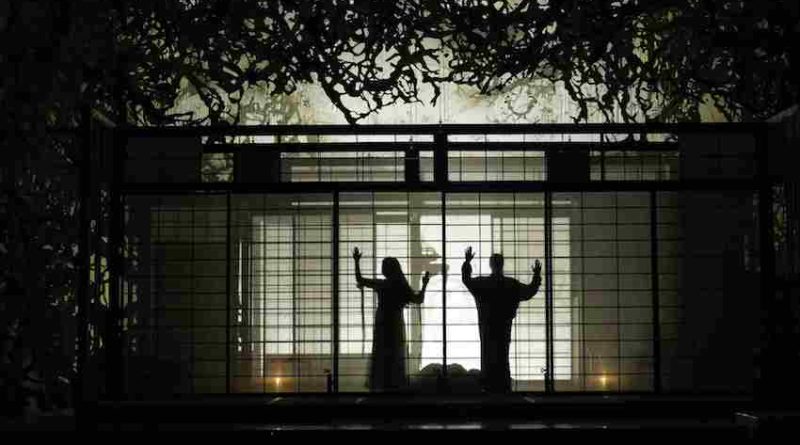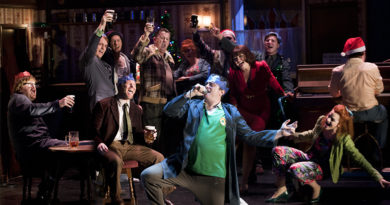Madame Butterfly at Bristol Hippodrome
Welsh National Opera complete their run of three operas this week at Bristol Hippodrome with another classic by Puccini. The last time I saw this opera, with the same group of friends, it was a scaled down version, sung in English, with a tiny orchestra. And it dismayed me; the terrible patriarchy leaving me so furious that one of our group still comments on how she has never seen anyone react so strongly to any piece of theatre. As for the performance itself, I felt sure then that I needed to experience this opera in all its pomp, in Italian, with a full orchestra, grand set, large stage and complete cast. This outing to the Bristol Hippodrome would be my chance.
The first thing you notice about WNO’s Madame Butterfly is Reinhart Zimmermann’s impressive set design; Lieutenant Pinkerton’s newly acquired house is set high on the hills of Nagasaki at the turn of the 20th Century, overlooking the (poorer? more modest?) indigenous people, their tiny houses reaching up to the majestic trees in full and glorious blossom, a neighbourhood dwarfed by the American Navy, at at time when the USA was finding and flexing its muscle.
Pinkerton’s appropriation of Cio-Cio-San, aka Madame Butterfly, is representative of the cultural and political might of the USA, his disregard for her feelings and his indifference to her ostracisation by her traditional community illustrative of a young country’s disregard for the old. He will leave her, their marriage will be meaningless and she will be heartbroken, driven to suicide after such a long parting that has led to destitution. And so what? To Sharpless, the American Consul, Pinkerton pays no heed as all warnings are disregarded. To Pinkerton and his new, legitimate wife, Butterfly leaves the son she has borne her deserter of a husband, knowing that her end will allow the boy’s real beginning.
Tonight, Welsh soprano Natalya Romaniw replaces the ‘indisposed’ Karah Son as Butterfly at the last minute and this marks her debut with WNO. Hers is a solid performance and she works well with the cast – demure yet somehow strong, quick to renounce her beliefs but cautious (in thought, if not in deed). Her aria ‘One fine day we’ll see’, where she tries to convince her loyal and doubting servant Suzuki that all will be well, is clean and heartfelt. On stage, the opera belongs to Madame Butterfly and Romaniw more than fills the role as this young and hopeful girl. Jonathon Burton as Pinkerton is comfortable in his arrogance and this tenor shines as this conceited man who is simply and disastrously having his bit of fun. As heavily as Romaniw is applauded by the audience when the curtain falls, Burton is boo-ed and hissed at. However, for a second time, I find myself not exactly liking the man but certainly not hating him (I think I’m supposed to). It also seems to me that this story has lost relevance over time – a woman promised the world and abandoned by ‘her’ man, left to fend for herself with a young child? Nothing new there. It’s not a situation unusual enough to bring despair and so, once again, I have less sympathy for the title character than I perhaps should (though very well played). Rebecca Afonwy-Jones as Suzuki brings fine acting abilities to the part and you can feel her dismay in those troubled expressions throughout, while Simon Crosby Buttle’s marriage broker, Goro, adds a somewhat comic edge to the proceedings. David Kempster’s Sharpless brings gravitas and you wish that Pinkerton would listen to his advice.
My favourite moment of the show is probably when Butterfly’s wedding guests – her family, her friends, her neighbours – renounce her and her marriage, the cast of women berating her sadly as they depart the house, their cries of ‘Cio-Cio-San’ haunting as they descend the hill to separate themselves but still be visible, their warnings fading into the traditions of life below. Kudos here to Chorus Master, Stephen Harris.
Everything is in sepia, down to Eleanore Kleiber’s gorgeous costumes, adding a filmic quality to the experience (I also wondered whether the browns and russets are representative of the life of a Japanese maple tree?).
Once again, though, it’s the music that really brings WNO’s production to life. Conductor Andrew Greenwood stands above the strong orchestra, the musicians rising to Puccini’s score. We can’t help but watch them play, their performance commands it and, at points, we’re all staring at them rather than what is happen up there on the stage. They are beautiful and some are clearly having a lot of fun.
If the first act flew by (exactly an hour), the second seemed to be slightly dragged out and we all agreed that some of the scenes could have benefitted from a little pruning. The plot isn’t actually very difficult but read up on it before you go to see Madame Butterfly and don’t worry too much about glancing up at every single surtitle (the turnover of words is fast) – better, we reckon, to sit back, enjoy the spectacle, check out the orchestra and let it all flow.
Welsh National Opera tours Madame Butterfly until 29th April
You can see what else is coming up at Bristol Hippodrome on their website
Image by Robert Workman, with thanks




